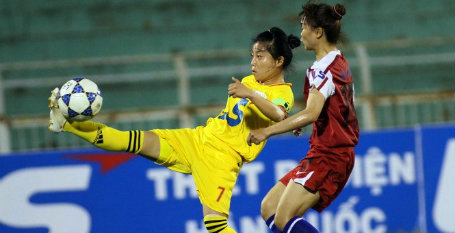Vietnam bans transgender players from participating in national women’s football championship and the Philippines-based pro-gaming organizer Garena eSports chose to limit the number of gay and transgender competitors in its all-female tournaments.
Transgender players in Southeast Asia were at the receiving end of discrimination recently when Vietnam banned transgender players from participating in the National Women’s Football Championship and the Philippines-based pro-gaming organizer Garena eSports chose to limit the number of gay and transgender competitors in its all-female tournaments.
The Vietnam Football Federation would not allow transgender players in its national championship set to begin on March 5.
“The national championship is exclusively for women, so transsexuals will not be allowed,” Duong Nghiep Khoi, vice secretary of the federation, was quoted by thanhniennews.com as saying. “This regulation is to ensure fair competition and for the development of Vietnam women’s football,” Khoi said.
He did not say whether there are any players affected by this ban, or how many there are in the championship of seven teams that will play each other in two legs.
The first part is to take place March 5-26 and the second from June 21 to July 12. The champion will win VND300 million (US$14,050) and the runner up VND200 million. The competition also awards prizes for fair-play team, best goalkeeper, best player, top scorer and best referee team.
Hardly had the dust settled in Vietnam over this ruling, when Garena eSports which runs competitive events throughout Southeast Asia said it would limit teams to one “gay/transgendered woman” for each tournament day. Garena eSports runs the popular professional multiplayer battle game League of Legends which has around 30m active players a day.
“There are arguments and concerns from other participants who disputes that Lesbian, Gay, Transgendered Women members may probably have some unfair advantage,” said an official statement.
“In what universe would somebody’s sexual preferences, gender identity, or current genital load-out have any impact on their ability to compete in a digital medium?” asked one person on the Garena Sports site.
In the Philippines “gay” often refers to “bakla,” a local term for men who present as women but do not necessarily self-identify as female.
The ensuring furor on social media then forced Garena eSports to withdraw its ruling. In a statement on its website it said that’s its initial ruling on LGBT player restrictions created so much “discussion” with 24 hours that it has since decided to remove these restrictions completely.
“This means that any player who self-identifies as female will be allowed to participate. We sincerely apologize for any offence we caused to the LGBT and gaming communities,” it said.
Transgender players in Southeast Asia were at the receiving end of discrimination recently when Vietnam banned transgender players from participating in the National Women’s Football Championship and the Philippines-based pro-gaming organizer Garena eSports chose to limit the number of gay and transgender competitors in its all-female tournaments.
The Vietnam Football Federation would not allow transgender players in its national championship set to begin on March 5.
“The national championship is exclusively for women, so transsexuals will not be allowed,” Duong Nghiep Khoi, vice secretary of the federation, was quoted by thanhniennews.com as saying. “This regulation is to ensure fair competition and for the development of Vietnam women’s football,” Khoi said.
He did not say whether there are any players affected by this ban, or how many there are in the championship of seven teams that will play each other in two legs.
The first part is to take place March 5-26 and the second from June 21 to July 12. The champion will win VND300 million (US$14,050) and the runner up VND200 million. The competition also awards prizes for fair-play team, best goalkeeper, best player, top scorer and best referee team.
Hardly had the dust settled in Vietnam over this ruling, when Garena eSports which runs competitive events throughout Southeast Asia said it would limit teams to one “gay/transgendered woman” for each tournament day. Garena eSports runs the popular professional multiplayer battle game League of Legends which has around 30m active players a day.
“There are arguments and concerns from other participants who disputes that Lesbian, Gay, Transgendered Women members may probably have some unfair advantage,” said an official statement.
“In what universe would somebody’s sexual preferences, gender identity, or current genital load-out have any impact on their ability to compete in a digital medium?” asked one person on the Garena Sports site.
In the Philippines “gay” often refers to “bakla,” a local term for men who present as women but do not necessarily self-identify as female.
The ensuring furor on social media then forced Garena eSports to withdraw its ruling. In a statement on its website it said that’s its initial ruling on LGBT player restrictions created so much “discussion” with 24 hours that it has since decided to remove these restrictions completely.
“This means that any player who self-identifies as female will be allowed to participate. We sincerely apologize for any offence we caused to the LGBT and gaming communities,” it said.












 打印版本
打印版本

















读者回应
Hello my dear,
i am happy to contact you after
viewing your profile and it interest
me to contact you for a genuine relationship,
please contact me here(nicolemakuza1992@hotmail.com)
so that i will share my feelings with
you for further communication.
Thanks, your friend Nicole.
(nicolemakuza1992@hotmail.com)
请先登入再使用此功能。